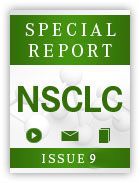Dr. Geoffrey R. Oxnard on When to Change EGFR TKIs
Geoffrey R. Oxnard, MD, Assistant Professor of Medicine, Harvard Medical School, talks about the treatment options for patients with lung cancer who have become resistant to their first-line treatments.
Geoffrey R. Oxnard, MD, Assistant Professor of Medicine, Harvard Medical School, talks about the treatment options for patients with lung cancer who have become resistant to their first-line treatments.
Oxnard says the standard of care is chemotherapy with pemetrexed and platinum based on the IMPRESS trial, which showed a response rate of 32% and a profession-free survival rate (PFS) of 5 to 6 months. He adds that other options for patients are now available, such as afatinib which has a response rate of around 10% and a PFS of about 3 months.
Oxnard also says emerging EGFR inhibitors such as rociletinib and osimertinib could be options for patients as well, depending on the situation.
